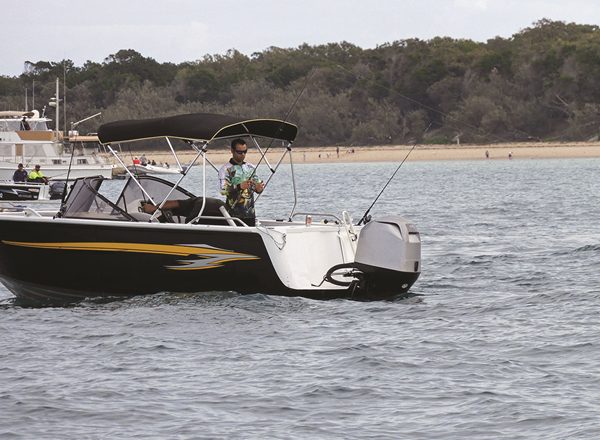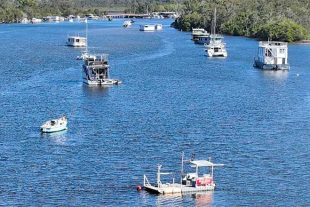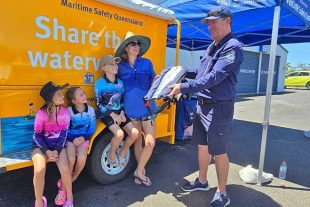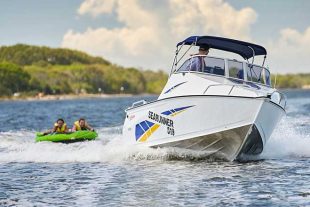REPOWERING a vessel can make a great deal of sense for a wide variety of reasons – greater reliability, better fuel economy and improved performance being just a few. Nautilus Marine Insurance is able to accommodate the greater value that a repower can add to the vessel. However, it is not an open book and it pays to understand the rules. Repowering Boat
The first is to ensure the powerplant being added to the vessel sits within the boat manufacturer’s specifications. If the boat was originally rated to take an outboard of up to 200hp, you can’t simply bolt on a 250hp outboard and expect it will be insurable. You have stepped outside the manufacturer’s specifications.
Some boaties might argue that the newer four-stroke outboard to be installed is lighter than the original and therefore it is OK to put on more horsepower than the manufacturer’s original maximum. Not so.
The weight of the motor and the maximum power are important, but they are two separate issues which must be considered individually and cannot be simply interchanged. Similarly, the outboards might have been designed for different transom heights and transom angles. In these cases, contacting the boat’s manufacturer and getting a clear direction in writing about the repower make good sense. Repowering Boat
It’s the type of information that a specialist like Nautilus Marine Insurance will look for when making a decision about the insurability of the vessel with its new powerplant. If the manufacturer is no longer in business, you can enlist the assistance of a naval architect who will be able to provide you with a professional opinion, and who can certify that the proposed repower is within the capabilities of the vessel.
Similarly, you will need confirmation from the vessel’s original manufacturer that the vessel is suitable for a twin outboard installation of say 115hp instead of a single 250hp. Again, it is not automatically valid to claim that twin 115hp outboards total 230hp, which is less than 250hp, so the repower must be permissible. The torque needs to be considered along with the combined weight of the outboards, and the location and distribution of that mass. Repowering Boat
Fortunately, many boat models carry a maximum horsepower for a single outboard but offer a rating for a twin outboard installation as an option. In those cases, it often is a far simpler route to ensuring the insurability of the repowered vessel. Then there’s the question of the condition of the transom itself.
While the maximum horsepower of the new motor, and its weight and suitability to the height of the transom might all stack up in terms of specifications, you also need to consider whether the transom is in excellent condition. It is not uncommon for some vessels to suffer transom degradation due to a myriad of reasons – from amateurs drilling holes into them to accommodate the installation of electronics, bait buckets and grab rails, to water ingress resulting from structural stresses and separation. Repowering Boat
Ordinarily, such occurrences can be remedied by a professional boat builder and the remediation works can be reflected in the new value of the vessel. To ensure it is, you will need to present receipts and documentation from professional and recognised boat repairers. Once you decide you’re going to install a new outboard pod on the back of your boat to accommodate a new power installation, you are potentially raising the stakes even higher.
Someone such as a certified boat builder or naval architect will have to sign-off on the structural integrity and performance of the modified vessel if you are going to secure marine insurance for it. A good strategy is to talk to Nautilus Marine Insurance first. Repowering Boat
Discuss what is being planned and ask what the requirements would be for insuring the vessel once the modifications have been carried out. When it comes to marine insurance, always check your Product Disclosure Statement and if you have a query, ask your insurer for clarification. Any special conditions and excesses should always be explained clearly in your insurance policy’s PDS.
If you need further information, you can contact Nautilus Marine Insurance on 1300 780 533 for any boat insurance requirements. Repowering Boat
 Bush ‘n Beach Fishing Magazine Location reports & tips for fishing, boating, camping, kayaking, 4WDing in Queensland and Northern NSW
Bush ‘n Beach Fishing Magazine Location reports & tips for fishing, boating, camping, kayaking, 4WDing in Queensland and Northern NSW









